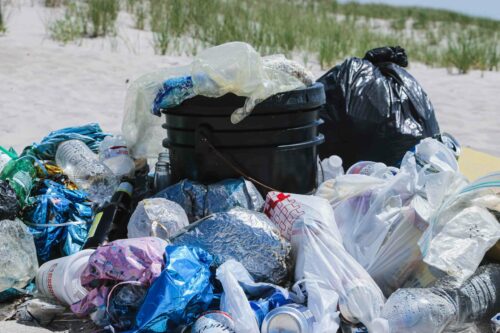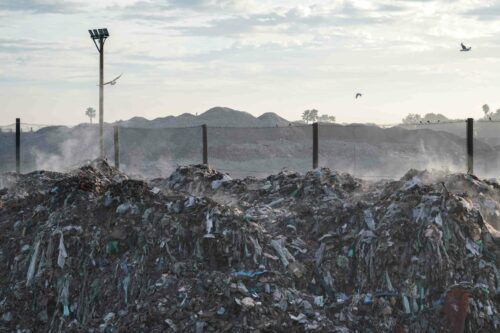From 2024, we are increasing the amount of beach and ocean plastic we collect per board, wing, and SOMWR garment from 1.1 kg to 1.4 kg with the help of our Plastic Offset Program crews.
Why are we increasing collection from 1.1kg to 1.4kg?
Since 2018 we have collected 1.1 kg of plastic for every product sold. This represented the average amount of ocean plastic each person was responsible for entering the ocean every year. We calculated this by dividing the total amount of ocean plastic in 2018 by the global population.
However, the amount of plastic in our oceans is on the rise and is rising faster than population growth. This means that the amount of ocean plastic we are all responsible for has actuallly increased to an average of 1.4 kg per person.
Where do the numbers come from?
The claim that each person is responsible for 1.4 kg of plastic entering the ocean every year is a generalized estimate based on global data. The precise amount of plastic pollution in the ocean is difficult to measure due the vast distribution of plastic debris and limitations in data collection methods.
When we decided to update our calcualtion we scoured the internet for reliable information on ocean plastic and identified the 9 below as the most trustworthy:
- NRDC – 8 million tonnes = 1kg per person
- Plastic Oceans – Over 9 million tonnes = 1.1kg per person
- Ocean Conservancy – 11 million tonnes = 1.4kg per person
- UNEP – 11 million tonnes = 1.4kg per person
- Reuters – 11 million tonnes = 1.4kg per person
- Surfers Against Sewage – 12 million tonnes (referencing this paper from 2016) = 1.5kg
- Parley – 12.7 million tonnes (14 million tons) = 1.6kg per person
- Condor Ferries – 12.7 million tonnes = 1.6kg per person
- Oceana – 14.7 million tonnes (33 billion pounds) = 1.8kg per person
As you can see from these sources the total estimated amount of ocean pollution varies from 8 million tonnes to almost 15 million tonnes. We chose to focus on 11 million tonnes as this is somewhere in between, and appears in 3 separate reports from reputable sources. 11 million tonnes of ocean plastic divided by 8 billion people means we are, on average, responsible for 1.4kg of plastic polluting our oceans.
Why Starboard collects beach plastic
As our products are mostly made of plastic, we are well aware that we are part of the plastic problem, so we will be picking up plastic litter along the beach in order to raise awareness of the importance of the ocean and support the local community and reduce our beaches from plastic pollution. By collecting 1.4kg of plastic for each of our products, we aim to sensibly reduce the amount of plastic that enters the oceans per person each year.
It’s worth emphasizing that regardless of the precise figure, plastic pollution in the ocean is a significant environmental issue. That has detrimental impacts on marine ecosystems, wildlife, and human health. Efforts to reduce plastic waste, improve waste management systems, and promote recycling and sustainable practices are crucial in addressing this global problem.
WE ARE ALL RESPONSIBLE FOR OCEAN PLASTIC
Overconsumption and Single-Use Culture:
One of the key contributors to the staggering amount of plastic entering our oceans is our society’s addiction to overconsumption and the pervasive culture of single-use items. From plastic bags and bottles to packaging materials and disposable utensils, our reliance on these convenient but harmful products has far-reaching consequences. By reducing our consumption of single-use plastics, we can significantly decrease the amount of waste generated and ultimately prevent it from polluting our oceans.
Inadequate Waste Management Systems:
Insufficient waste management infrastructure and practices play a significant role in the plastic pollution crisis. In many parts of the world, improper disposal and inadequate recycling facilities lead to vast amounts of plastic waste ending up in landfills, and waterways, and eventually making their way into the ocean. By supporting and advocating for improved waste management systems. We can help minimize plastic leakage and promote more effective recycling and waste reduction strategies.
Littering and Poor Waste Disposal Habits:
Littering and improper waste disposal habits are deeply ingrained societal issues that exacerbate plastic pollution. Whether it’s discarding plastic items on streets, beaches, or rivers. These actions often result in plastic waste being carried by wind and water currents. Ultimately finding their way into our oceans. By taking individual responsibility for our waste and adopting proper disposal habits. We can prevent plastic from entering marine ecosystems and preserve the health of our oceans.
Limited Awareness and Education:
Insufficient awareness and understanding of the impact of plastic pollution on marine environments also contribute to the ongoing crisis. Many people are unaware of the long-lasting consequences of plastic waste on marine life, ecosystems, and human health. Therefore, by actively seeking knowledge and educating ourselves about the environmental impact we can make informed choices and inspire others to take action. Read here to find out more about our POP environmental education program.
Supporting Sustainable Alternatives:
Transitioning to sustainable alternatives is a crucial step in reducing plastic pollution. From reusable bags and bottles to eco-friendly packaging materials, embracing sustainable options can significantly reduce the demand for single-use plastics. By supporting businesses and initiatives that prioritize sustainable practices, we can drive the shift towards a more environmentally conscious society.
It is important to note individuals have a role to play in reducing plastic pollution, systemic changes, and government policies. Collaboration among individuals, businesses, and governments is crucial to implement sustainable solutions. For example: promoting recycling infrastructure, encouraging plastic alternatives, and supporting legislation to reduce plastic waste.
The harrowing reality of plastic pollution demands urgent action from each and every one of us. By acknowledging our collective responsibility and understanding the factors contributing to this crisis. We can begin to make meaningful changes in our daily lives. Whether it’s reducing our consumption of single-use plastics, practicing proper waste disposal, or advocating for improved waste management systems.
Let’s take responsibility and work towards a future where our oceans are free from the burden of plastic pollution.
















